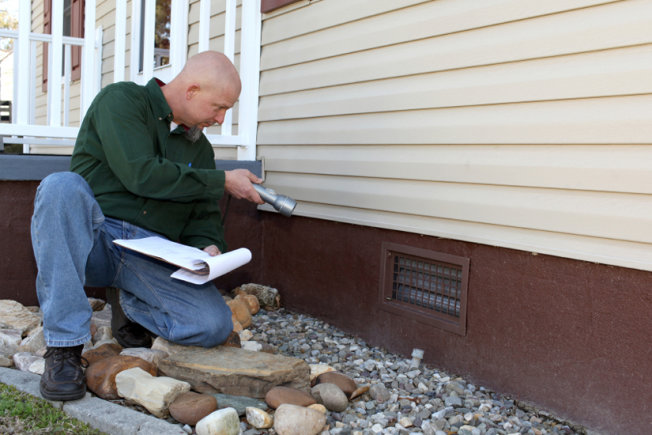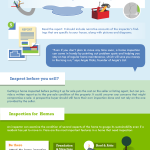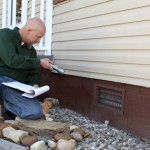You’ve found the house of your dreams, the seller has accepted your offer and you can’t wait to move into your new digs. But before measuring for curtains or purchasing furniture, there’s another important step in the homebuying process you shouldn’t skip: the home inspection.
Sure, you had your Uncle Joe tour the house with you, and he thought everything looked good. But what about the plumbing, electrical wiring and potential termite damage? Is there mold or moisture lurking inside the walls? It’s time to call in a professional.
Real estate experts advise getting a home inspection before you close on a property. “This is the single largest investment a buyer is likely to make in their lifetime, and the home inspection is like getting a physical checkup on the house,” says Cara Ameer, broker associate at Coldwell Banker Vanguard Realty Inc. in Ponte Vedra Beach, Florida. “As a buyer is walking through the home, all you can see is what’s visible to you. A home inspector shows what is visible and invisible to the untrained eye.”
“Unlike a car, there is no ‘check engine’ light,” adds Frank Lesh, executive director of the American Society of Home Inspectors.
How does it work? Generally, a buyer will make an offer with a home-inspection contingency. Double-check to make sure it’s in your contract. Then, once the home goes under contract, the buyer can hire a home inspector to examine a property. The home inspector will physically inspect the property from the roof to the foundation, and will assess the condition of various systems including plumbing, heating and cooling to identify any trouble spots. The inspector will detail his or her findings in a written report within 24 to 48 hours of completing the inspection.
The cost of an inspection varies depending on location and the size of the home. “A more thorough report for a larger property will likely cost more than a report for a one-bedroom condo,” says Zev Fried, senior financial planner and mortgage specialist at JSF Financial Services LLC in Los Angeles.
The cost could run anywhere from $350 to $1,000. “But you cannot put a price on the value of getting a property checked out,” Ameer says. “It is a small price relative to the purchase price of the home.”
Also, you can have the comfort of knowing a professional inspector is truly working for you. Many other people involved in the sale of a property have a vested interest in the sale via their commission, but inspectors’ only obligation is to the buyer of the home, Lesh says. “We have nothing to sell but the truth, and to let the homeowner know what is right and what’s wrong,” he says.
What can they find? Water is a silent enemy, experts say. “The No. 1 problem with homes are leaky basements with water getting into the lower level. For new, first-time homebuyers, that can be an overwhelming problem,” Lesh says.
A qualified home inspector can alert buyers to any potential damage that may have been caused by basement flooding or water damage, even in the walls.
“People are concerned about mold, moisture and leaks,” Ameer says. When you interview potential inspectors, she advises asking them about the types of tools they will be using to assess the condition of your home.
“You want an inspector that will make an investment in tools and technology that will give you the best information possible. Ask the inspector if they have infrared technology in their camera. Through infrared imaging, they can for example detect moisture in walls or plumbing leaks,” Ameer explains. “I’d want an inspector using an infrared camera, not just a moisture meter to pick up water issues.”
Back to the negotiation table. If your home inspector finds trouble spots or determines that, for example, a roof has surpassed its life expectancy, the buyer can return to the seller with this information and try to adjust the selling price.
“That report is your evidence to lay out to a seller what repair or condition issues exist. You can go to the seller with a list of items that you would like addressed. This is round two of the negotiations. Now you are battling, ‘is this price worth it, given the conditions?'” Ameer says.
However, it is important to consider market conditions. For example, are you in a bidding war with other buyers for the property? That could limit the bargaining power of the inspector’s findings.
“One can use the inspector’s report as a bargaining chip within reason. If the issue is serious, such as mold, the buyer may have leverage. If it’s relatively trivial or it is a highly desirable property, the buyer’s leverage may be diminished, as the seller may be able to easily find another buyer,” Fried says.
How to find a home inspector. Ask your real estate agent for referrals, as he or she should have a good working knowledge of the inspectors in your area. Also, look for an inspector with membership in either the American Society of Home Inspectors or the National Association of Home Inspectors.
Generally, you can find qualified inspectors this way. “Real estate agents want to be careful who they refer …They want to protect themselves from liability as well, and want to make sure that the people they refer will be objective and do a thorough job. They don’t want an unhappy customer that bought a home in which issues were not discovered, because that ultimately will reflect on them,” Ameer says.
Even once you are a proud homeowner, getting a follow-up inspection every few years can be a good idea in terms of routine maintenance for your home, experts say. “The average person lives in a home for seven years. But you can’t live in a home for seven years and not do anything,” Lesh says.
Welcome to the world of home ownership.
http://web.archive.org/web/20160210221310/http://money.usnews.com/money/personal-finance/articles/2015/03/10/buying-a-home-dont-skip-the-inspection








